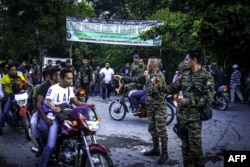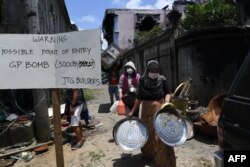A second year of martial law in parts of the Philippines is squelching any comeback by violent Muslim insurgents after a civil war, despite earlier fears that the order would also curb common people’s freedoms, witnesses say.
Philippine President Rodrigo Duterte extended martial law through 2018 after declaring it in May 2017 so troops and national police could fight rebels in Marawi, a mountainous, largely Muslim city in the south. The law covers all of Mindanao, home to Marawi and about one-fifth of the Philippine population and a hotbed for armed insurgency since the 1960s.
A network of road checkpoints outside major cities, permission for authorities to frisk people without warrants and evening-to-morning curfews have helped troops throttle further violence by Muslim rebels without routine harassment of common people, said Eduardo Araral, a Mindanao native and associate professor at the National University of Singapore’s public policy school.
“That (law) could slow down the plans of the terrorists or even small wildcat operations,” he said. “They couldn’t just enter the cities without being frisked at the borders by the military, and they needed martial law for that,” he said. “So, I think it also calmed down the nerves of the city residents. My relatives who live in Mindanao are very happy with this.”
Fear of a Marcos-era repeat
When Duterte declared martial law in 2017 to help quash the Islamic State-inspired Maute Group in Marawi, some Filipinos worried it would erase their personal freedoms by letting police or military units do as they pleased without due process. Troops declared victory over the Maute Group in October after more than 1,100 people had died in the fighting.
Some locals remembered the harsher measures taken by authoritarian former-president Ferdinand Marcos in 1972. The law then called for curfews, bans on public assembly and military arrests of people who were suspected of plotting against the government.
New rules for Mindanao
Martial law in Mindanao has restricted the movement of armed rebels, including possible Islamic State operatives, largely by keeping them out of the cities. Cities in turn empty after dark because of the curfews.
Rural military and police outposts established under martial law are freer now to track rebel movement by stopping and interrogating suspects.
Authorities at road checkpoints in the 800,000-population city of Zamboanga, for example, have required that anyone entering the city to show some identification. Checkpoints near Iligan, a city that absorbed war refugees from Marawi because of its proximity, make almost everyone get out of their cars for inspection.
In Davao, the second largest city in the Philippines, the mayor once declared a lockdown blocking all entries into town.
Squelching rebels, drug trade
Martial law is widely accepted for now as a tool for squelching rebels as well as the illegal drug trade, said Habib Macaayong, president of the Mindanao State University system based in Marawi.
“Martial law is very helpful because it is an instrument for controlling various elements, and it is very good for the meantime,” he said.
Muslim insurgents on Mindanao believe the Philippine Catholic majority has taken an unfair share of resources despite five centuries of Muslim settlement. Rebel-linked violence has killed about 120,000 in Mindanao since the 1960s and even after apparent military victories, insurgencies have tended to resurface.
This year, troops used airstrikes to kill 44 Mindanao rebels during an attack in March. Troops and suspected Maute Group remnants fired at each other near Marawi in June, but a presidential spokesperson said martial law would stop the rebels from expanding.
A suspected suicide bomber, possibly from abroad, killed 11 people including himself July 31 by blowing up a van on a Sulu Sea island near Mindanao, local media reported.
Return to normal routines in war-torn city
Today in Marawi, people freely go to classes at the wooded Mindanao State University campus and sit outside classroom buildings chatting with classmates afterward. In town, except for a cordoned-off tract of the city destroyed by the war, merchants sell bananas from roadside shops and tend to small farms. Soldiers inspect cars at two checkpoints on the main highway just north of the city.
In Mindanao’s cities with little history of violence, checkpoints are few and curfews unenforced.
“My first impression of martial law was, martial law in the time of Marcos, it was very brutal, but this martial law is not the same,” said Annajar Aminnajar, a 20-year-old university graduate from Marawi who still lives nearby. He said soldiers now detain people out past 9 p.m. but just ask most to go home.
“It’s different because even though there’s martial law, we can still walk freely,” he said. “Right now, martial law, but in terms of better security, security for Marawi and in Mindanao.”






